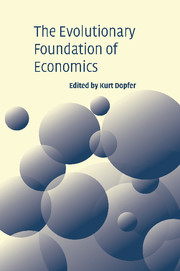Book contents
- Frontmatter
- Contents
- List of contributors
- List of figures
- List of tables
- Prolegomenon
- I Ontological foundations
- 2 The rediscovery of value and the opening of economics
- 3 Synergetics: from physics to economics
- 4 Darwinism, altruism and economics
- 5 Decomposition and growth: biological metaphors in economics from the 1880s to the 1980s
- 6 Path dependence in economic processes: implications for policy analysis in dynamical system contexts
- 7 Is there a theory of economic history?
- II A framework for evolutionary analysis
- Index of topics
- Index of names
- References
5 - Decomposition and growth: biological metaphors in economics from the 1880s to the 1980s
Published online by Cambridge University Press: 22 September 2009
- Frontmatter
- Contents
- List of contributors
- List of figures
- List of tables
- Prolegomenon
- I Ontological foundations
- 2 The rediscovery of value and the opening of economics
- 3 Synergetics: from physics to economics
- 4 Darwinism, altruism and economics
- 5 Decomposition and growth: biological metaphors in economics from the 1880s to the 1980s
- 6 Path dependence in economic processes: implications for policy analysis in dynamical system contexts
- 7 Is there a theory of economic history?
- II A framework for evolutionary analysis
- Index of topics
- Index of names
- References
Summary
Introduction
In economics, the word ‘evolutionary’ is currently in fashion. Since the 1980s the number of economics books and articles with ‘evolution’ in their title has increased rapidly. This revolution is not confined to heterodoxy. Leading neoclassical economists such as Kenneth Arrow and Frank Hahn have turned away from mechanics, seeing biology as the possible inspiration for the economics of the future (Anderson, 1995; Arrow 1995; Hahn, 1991, p. 48).
The relationship between biology and economics has waxed and waned over the centuries and has worked in both directions. The influence of the economists Adam Smith and Thomas Robert Malthus on Charles Darwin is widely known, even if some of the details remain controversial (Hodgson, 1993b, 1995). Ideas of competition and struggle in the writings of Smith and Malthus simultaneously inspired economics and biology. Accordingly, to some degree, biological metaphors have always been present in the foreground or background of modern economic theory. What is striking, however, is the temporal variation in the degree of their explicit popularity and use.
With the emergence of neoclassical economics in the 1870s, its principal inspiration was not biology but physics (Mirowski, 1989; Ingrao and Israel, 1990). Yet by the end of the nineteenth century the picture in economics was again modified. Alfred Marshall wrote that ‘the Mecca of the economist lies in economic biology’ (Marshall, 1890, p. xiv). Furthermore, leading heterodox economists such as Thorstein Veblen enthusiastically embraced biology.
- Type
- Chapter
- Information
- The Evolutionary Foundations of Economics , pp. 105 - 148Publisher: Cambridge University PressPrint publication year: 2005
References
- 10
- Cited by



